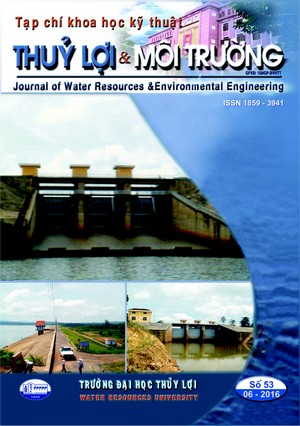Water quality assessment and integrated solutions for sustainable water resources management in Soc Trang province
Abstract
This work aims to assess water resources for domestic and irrigation purposes in coastal areas of Soc Trang province- one of the most vulnerable regions in the Mekong Delta to climate change and sea level rise, especially along the coastal areas where is severely affecting by seawater intrusion. The water quality index (WQI) and variable irrigation water quality indexes (IWQIs) such as sodium adsorption ratio (SAR), Kelly's ratio (KR), residual sodium carbonate (RSC), solute sodium percentage (SSP) and permeability index (PI) were deployed to evaluate water quality regarding domestic and agricultural water demands. Totally, 142 water samples were taken by seasonal characteristics and tidal regime in 2013 and 2014, and analyzed for the calculation of WQI and IWQIs. The results show that, most of the groundwater samples at shallow aquifers, some of the deeper aquifers and river water samples in dry season were seriously affected by seawater intrusion and nitrate contamination. Meanwhile, most of the groundwater samples at middle and lower Pleistocene aquifers and surface water in rainy season seem to be good for both drinking and irrigation. However, the groundwater source in Soc Trang province has been excessively extracted without suitable regulation and appropriate management. This situation may threat the groundwater source because it can be easily contaminated by seawater intrusion and wastewater. In order to effectively extract, use and manage the fresh water source in coastal areas in the Mekong delta, emergent management practices should be considered
điểm /
đánh giá
Published
2016-12-06
Issue
Section
SCIENTIFIC ARTICLE

